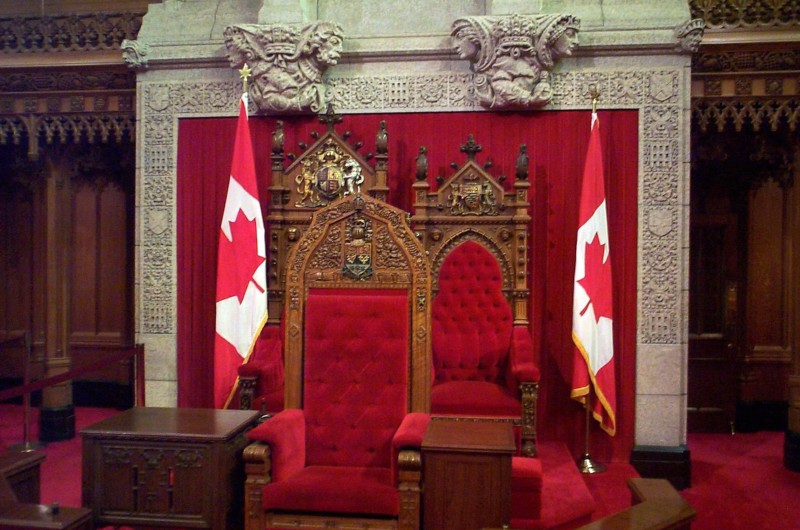
A House Undivided: Highlights and recommendations
Recommendations by Hugh Segal and Michael Kirby

https://medium.com/@PPForum/b773ad28b786
Background
Prime Minister Justin Trudeau has set the Senate of Canada on an independent course, but has not given it a map to chart its journey. That will be up to the Senate to figure out.
At the request of Public Policy Forum President and CEO Ed Greenspon, former Senators Michael Kirby and Hugh Segal have written A House Undivided: Making Senate Independence Work, which recommends actions that can be taken to ensure the Senate can thrive in its post-partisan future — without constitutional amendments. As they write, “the Senate will be the author of its own fortune or misfortune.”
Summary of recommendations
· We recommend that a major rewrite of the Senate rules once again be undertaken. The current rules are premised on assumptions that are out of sync with the values that necessary for the good functioning of an independent Senate. Indeed, the partisan structure of the current Orders of the Senate leaves zero role for Independents.
· As the Senate was originally organized on the basis of regional representation, we recommend this as a sound way to proceed in replacing the prerogatives of partisanship. The standing committees of the Senate need to be populated. Who speaks when, in which debates, needs to be determined. Decisions and trade-offs are necessary. Authority must rest somewhere.
· We recommend that the key passage from the Senate rules that favour party affiliation be rewritten to read along the lines of: The Senate is organized around the principle of regional caucuses. These groupings reflect the original intent of the framers of the Senate. These regional caucuses will encompass all Senators from the given region regardless of any other affiliation. They will select their own caucus convenors and deputy convenors, who will be responsible as a group for the allocation of membership on standing Senate committees, speaking lists in the chamber, allocation of offices, committee travel and any other such issues. Regional caucuses will meet weekly while the Senate is in session and at any other times deemed appropriate by their convenors.
· We recommend the regional convenors meet weekly with the Government Representative in the Senate, the Government Liaison and the Speaker of the Senate. This group will constitute the Senior Council within the Senate and may or may not select another committee to enforce rules and standards agreed to by Senators. We also recommend that the Senior Council, subject to the support of the majority of regional caucuses, quickly move to set compensation levels for the newly named positions as well as budgets for their offices in keeping with levels established for partisan officers in the previous rules.
· We offer these specific recommendations in the hopes it will be useful to the Modernization Committee and the Senate as a whole. In this we make five recommendations we believe can be effected either within the Senate itself or by an Act of Parliament passed by both houses and the Crown, as was the case with the 1965 elimination of new life appointments for Senators:
1. That the Speaker of the Senate be chosen by Senators themselves by secret ballot, as Members of Parliament in the House of Commons do, rather than by the current practice of appointment by the Prime Minister advising the Governor General.
2. That standing committee chairs be selected by the committee membership as has become the practice in the House of Commons and that they serve for the full-term of the Parliament unless otherwise removed by a disciplinary process.
3. That question period in the Senate, which was always severely limited in effectiveness by the presence in the chamber of a single government minister, be refashioned altogether given the elimination of the position of Government Leader in the Senate. Instead, question period should be organized around three purposes: questioning of committee chairs; questioning of the Government Representative in the Senate on plans for government legislation; the new practice of weekly questioning of invited government ministers, as designated by the Senate. We are also impressed by the quality and depth of information gathering that has flowed from government ministers who are sponsoring legislation appearing before the Senate in committee-of-the-whole. This process is well grounded in precedent created by a 1947 rule change to permit a minister from the House of Commons to take part in a Senate debate in such circumstances.
4. That the minimum age requirement of 30 for a Senator be scrapped. While in most cases, we prefer a Senate of experience across a wide spectrum of knowledge and pursuits, we see no need for official age discrimination.
5. Removal of the requirement that Senators have a personal net worth of at least $4,000. Initially imposed to obstruct non-elites from entering the Senate, the logic today is as anachronistic as the sum is paltry. Either way, the principle is bad. The Senate legal affairs committee called for the removal of this condition in 1980 and the Supreme Court opened the door in its reference decision, finding: “It is precisely the type of amendment that the framers of the Constitution Act, 1982 intended to capture” under the unilateral federal amending procedure in that it updates the workings of the Senate “without affecting the institution’s fundamental nature and role.”
· We recommend the Senate be the initiator of the necessary legislative measures, introducing them first in the upper chamber while asking the leaders of all parties in the House and the Minister of Democratic Institutions to support the changes when they arrive in the House of Commons.
· We offer two recommendations regarding conflict resolution between the House of Commons and the Senate:
1. The revival of the long-standing convention of holding conferences between the two Houses in times of deadlock. We recommend conferences be reconstituted as a means of resolving dispute. Though it is nearly 70 years since they have been attempted, they offer civil and transparent method of conflict resolution appropriate for the newly independent Senate. We suggest that when conferences are convened, there be equal members from the House and Senate represented.
2. The legislated self-limitation of the Senate’s absolute veto (excepting money bills and certain constitutional provisions) to a six-month suspensive veto.
· We recommend the Government Representative should convene and chair a weekly meeting to which all Independents as well as other Senators are invited. This should not be seen as a partisan activity, but one of assisting the cause of a better informed Senator.
· We strongly recommend that the Privy Council Office provide the same level of support to the Government Representative as it did to the Government Leader beforehand.





